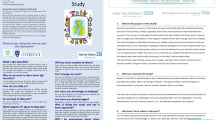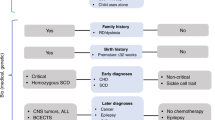Abstract
Objective
To determine the prevalence of limited health literacy in parents of infants born ≤32 and 0/7 weeks and if health literacy changes during hospitalization.
Study design
Multi-site, prospective cohort study measuring health literacy using the Parent Health Literacy Activities Test, which estimates caregivers’ ability to complete tasks such as reading prescription labels and preparing bottles. Data were analyzed using parametric and nonparametric comparison tests and multivariable regression to control for confounders.
Result
Of the 137 participants, 31% missed ≥3 questions of 8. Scores were not associated with admission characteristics or NICU complications. Lower scores were associated with lower nurses’ (rho 0.20, p = 0.04) but not parents’ (rho −0.12, p = 0.22) ratings of discharge readiness. Scores improved slightly from admission to discharge (p = 0.049).
Conclusion
Many parents have difficulty answering questions related to basic infant care tasks. NICUs should ensure that communication and discharge planning are mindful of health literacy.
This is a preview of subscription content, access via your institution
Access options
Subscribe to this journal
Receive 12 print issues and online access
$259.00 per year
only $21.58 per issue
Buy this article
- Purchase on Springer Link
- Instant access to full article PDF
Prices may be subject to local taxes which are calculated during checkout

Similar content being viewed by others
References
Nielsen-Bohlman L, Panzer AM, Kindig DA, editors. Health literacy: a prescription to end confusion. Washington: National Academies Press; 2004.
Vernon JA, Trujillo A, Rosenbaum SJ, DeBuono B. Low health literacy: Implications for national health policy. Washington: Department of Health Policy, School of Public Health and Health Services, The George Washington University; 2007.
U.S. Department of Health and Human Services. Healthy People 2010. Washington, DC: U.S. Government Printing Office. Originally developed for Ratzan SC, Parker RM. 2000. Introduction. In National Library of Medicine Current Bibliographies in Medicine: Health Literacy. (Selden CR, Zorn M, Ratzan SC, Parker RM, eds). NLM Pub. No. CBM 2000-1. Bethesda, MD: National Institutes of Health, U.S. Department of Health and Human Services (2000).
Tsai TI, Huang SH, Lee SY. Maternal and hospital factors associated with first-time mothers’ breastfeeding practice: a prospective study. Breastfeed Med. 2015;10:334–40.
Smith SA, Moore EJ. Health literacy and depression in the context of home visitation. Matern Child Health J. 2012;16:1500–8.
Zaslow MJ, Hair EC, Dion MR, Ahluwalia SK, Sargent J. Maternal depressive symptoms and low literacy as potential barriers to employment in a sample of families receiving welfare: are there two-generational implications? Women Health. 2001;32:211–51.
Harrington KF, Zhang B, Magruder T, Bailey WC, Gerald LB. The impact of parent’s health literacy on pediatric asthma outcomes. Pediatr Allergy Immunol Pulmonol. 2015;28:20–6.
Pulgaron ER, Sanders LM, Patino-Fernandez AM, Wile D, Sanchez J, Rothman RL, et al. Glycemic control in young children with diabetes: the role of parental health literacy. Patient Educ Couns. 2014;94:67–70.
Cheng ER, Bauer NS, Downs SM, Sanders LM. Parent health literacy, depression, and risk for pediatric injury. Pediatrics. 2016;138:e20160025.
Paschal AM, Mitchell QP, Wilroy JD, Hawley SR, Mitchell JB. Parent health literacy and adherence-related outcomes in children with epilepsy. Epilepsy Behav. 2016;56:73–82.
Morrison AK, Schapira MM, Gorelick MH, Hoffmann RG, Brousseau DC. Low caregiver health literacy is associated with higher pediatric emergency department use and nonurgent visits. Acad Pediatr. 2014;14:309–14.
MacDorman MF. Race and ethnic disparities in fetal mortality, preterm birth, and infant mortality in the United States: an overview. Semin Perinatol. 2011;35:200–8.
Institute of Medicine Committee on Understanding Premature Birth and Assuring Healthy Outcomes. The National Academies Collection: Reports funded by National Institutes of Health. In: Behrman RE, Butler AS, editors. Preterm birth: causes, consequences, and prevention. Washington: National Academies Press (US) National Academy of Sciences; 2007.
Yin HS, Johnson M, Mendelsohn AL, Abrams MA, Sanders LM, Dreyer BP. The health literacy of parents in the United States: a nationally representative study. Pediatrics. 2009;124 Suppl 3:S289–98.
Mackley A, Winter M, Guillen U, Paul DA, Locke R. Health literacy among parents of newborn infants. Adv Neonatal Care. 2016;16:283–8.
Skeens K, Logsdon MC, Stikes R, Ryan L, Sparks K, Hayes P, et al. Health literacy and preferences for sources of child health information of mothers with infants in the neonatal intensive care unit. Adv Neonatal Care. 2016;16:308–14.
Stephens BE, Tucker R, Vohr BR. Special health care needs of infants born at the limits of viability. Pediatrics. 2010;125:1152–8.
Ray KN, Lorch SA. Hospitalization of early preterm, late preterm, and term infants during the first year of life by gestational age. Hosp Pediatr. 2013;3:194–203.
Doyle LW, Ford G, Davis N. Health and hospitalistions after discharge in extremely low birth weight infants. Semin Neonatol: Sn. 2003;8:137–45.
Balakrishnan A, Stephens BE, Burke RT, Yatchmink Y, Alksninis BL, Tucker R, et al. Impact of very low birth weight infants on the family at 3 months corrected age. Early Hum Dev. 2011;87:31–5.
Wallace AS, Perkhounkova Y, Bohr NL, Chung SJ. Readiness for Hospital Discharge, Health Literacy, and Social Living Status. Clin Nurs Res. 2016;25:494–511.
Kumar D, Sanders L, Perrin EM, Lokker N, Patterson B, Gunn V. et al. Parental understanding of infant health information: health literacy, numeracy, and the Parental Health Literacy Activities Test (PHLAT). Acad Pediatr. 2010;10:309–16.
Broadbent E, Petrie KJ, Main J, Weinman J. The brief illness perception questionnaire. J Psychosom Res. 2006;60:631–7.
Brooks S, Rowley S, Broadbent E, Petrie KJ. Illness perception ratings of high-risk newborns by mothers and clinicians: relationship to illness severity and maternal stress. Health Psychol. 2012;31:632–9.
Smith VC, Young S, Pursley DM, McCormick MC, Zupancic JA. Are families prepared for discharge from the NICU? J Perinatol. 2009;29:623–9.
Kornburger C, Gibson C, Sadowski S, Maletta K, Klingbeil C. Using “teach-back” to promote a safe transition from hospital to home: an evidence-based approach to improving the discharge process. J Pediatr Nurs. 2013;28:282–91.
Brega AG, Freedman MAG, LeBlanc WG, Barnard J, Mabachi NM, Cifuentes M, et al. Using the health literacy universal precautions toolkit to improve the quality of patient materials. J Health Commun. 2015;20(sup2):69–76.
Brega AG, Barnard J, Mabachi NM, Weiss BD, Dewalt DA, Brach C, Cifuentes M, Albright K, West, DR. AHRQ’s Health Literacy Universal Precautions Toolkit. Agency for Healthcare Quality and Research. https://www.ahrq.gov/professionals/quality-patient-safety/quality-resources/tools/literacy-toolkit/index.html (2010). Accessed on 19 October 2017.
American Academy of Pediatrics Committee on Fetus and Newborn. Hospital discharge of the high-risk neonate. Pediatrics. 2008;122:1119–26.
Smith VC, Dukhovny D, Zupancic JA, Gates HB, Pursley DM. Neonatal intensive care unit discharge preparedness: primary care implications. Clin Pediatr (Phila). 2012;51:454–61.
Beck AF, Solan LG, Brunswick SA, Sauers-Ford H, Simmons JM, Shah S, et al. Socioeconomic status influences the toll paediatric hospitalisations take on families: a qualitative study. BMJ Qual Saf. 2017;26:304–11.
Enlow E, Herbert SL, Jovel IJ, Lorch SA, Anderson C, Chamberlain LJ. Neonatal intensive care unit to home: the transition from parent and pediatrician perspectives, a prospective cohort study. J Perinatol. 2014;34:761–6.
Obregon E, Martin CR, Frantz Iii ID, Patel P, Smith VC. Neonatal intensive care unit discharge preparedness among families with limited English proficiency. J Perinatol. 2019;39:135–42.
Acknowledgements
We would like to acknowledge Laura Rubinos, Nicolas Bamat, Danielle Foy, Sagori Mukhopadhyay, Toni Mancini, and Danielle D. Weinberg for their contributions to patient recruitment and data analysis. We would like to thank Vincent C. Smith and Beth Israel Deaconess Medical Center for allowing us to use their discharge readiness surveys. We would like to thank the Masters of Health Policy Research and the Leonard Davis Institute of Health Economics at the University of Pennsylvania for their support. The CHOP Neonatal Fellows’ Research Grant provided financial support for this work.
Author information
Authors and Affiliations
Corresponding author
Ethics declarations
Conflict of interest
The authors declare that they have no conflict of interest.
Additional information
Publisher’s note: Springer Nature remains neutral with regard to jurisdictional claims in published maps and institutional affiliations.
Supplementary information
Rights and permissions
About this article
Cite this article
Enlow, E., Gray, M.M., Wallace-Keeshen, S. et al. Health literacy of parents of very preterm infants at NICU admission and discharge: a prospective cohort study. J Perinatol 39, 866–875 (2019). https://doi.org/10.1038/s41372-019-0340-y
Received:
Revised:
Accepted:
Published:
Issue Date:
DOI: https://doi.org/10.1038/s41372-019-0340-y
This article is cited by
-
Identifying barriers and facilitators to care for infants with bronchopulmonary dysplasia after NICU discharge: a prospective study of parents and clinical stakeholders
Journal of Perinatology (2024)
-
The association of care transitions measure-15 score and outcomes after discharge from the NICU
BMC Pediatrics (2021)



